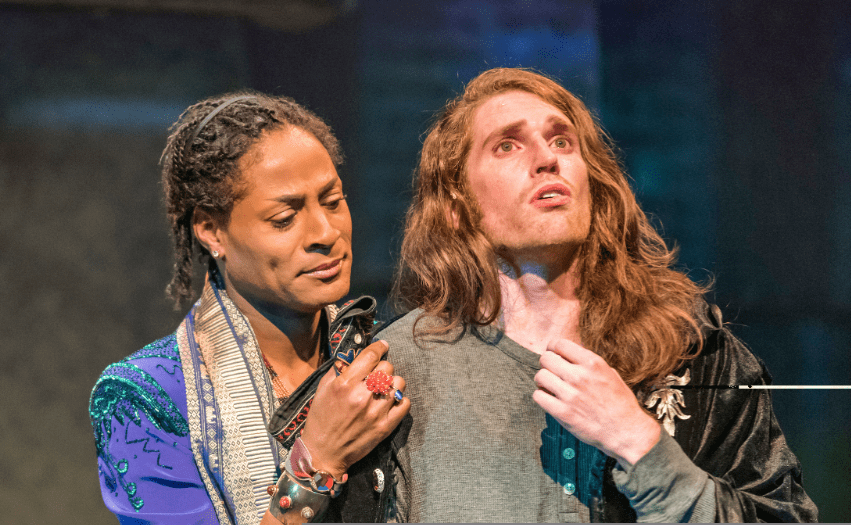Although Angels in America — Part One: Millennium Approaches is widely performed, the second part of the cycle — Part Two: Perestroika — is far less common … so infrequently is it revived, in fact, that author Tony Kushner has continued to revise and massage and update the text for decades, while Part One has remained a fixed piece of theatrical lit. That means there’s no “definitive” Part Two, no standard to judge any production by. And while the second half of this rangy play about AIDS during the Reagan years can be unwieldy and overlong (block out four hours from parking to exiting the theater), it’s also a revelatory piece of classical theater in modern dress.
Millennium Approaches is compelling, no doubt, especially in its portrait of unbridled cravenness in the personage of Roy Cohn (David Lugo), mentor and role model to one Donald Trump. His explication of what it means to be gay, or the exercise of political power, matched with the horrors of an HIV diagnosis and coming out as gay to yourself sets up an amazing contrast, but in the end not much happens. The “angels” in the title ends up being a single, solitary angel, who really only appears in the last scene. Part One isn’t really “part one” — rather, as Shakespeare said, “What is past is prologue.” The real play? Well, that’s onstage at the Kalita Humphreys for one more weekend only.
The Shakespearean analogy isn’t a reach; Part Two is divided, like the Bard’s plays in the original folios, into five acts. It begins with a thick-tongued soliloquy from an old Jewish man (Pam Daugherty) who never appears again. I have to believe that was intentional; it takes the ear at least 10 minutes to adjust to the rhythms of the speaking, to the pace of the dialogue, and the character primes us for the fantasia that follows, so that it can become as baroque as Macbeth.
Remarkably, Perestroika reaches into vast wells of emotion about forgiveness and death and family and peace by telling a story of basically only seven people over the course of four months in early 1986; its specificity is a magnifying glass on the deeper reaches of the struggles of America to grow up. (It does so, remarkably, by killing off God — by telling us that He abandoned humanity a century ago. Earth was but a child for all its existence, not it’s an adolescent, with all the hormonal uncertainty that comes with cultural puberty.)
The performances, once again, are outstanding. Garret Storms’ Prior Walter, suffering from AIDS and beset by visions of an angel who expects him to become a prophet, is the centerpiece. Clad in black robes and walking haltingly with a cane, like some French artists coping with the effects of gout, he cuts a striking silhouette and really galvanizes out attention. But David Meglino, as his selfish ex-lover Louis, shows how the callowness of his character from Part One can morph into a pitiable, self-hating human being. But everyone has his or her moments: Kyle Igneczi, David Lugo, Walter Lee, Emily Scott Banks, Marianne Galloway and Pam Daugherty, all reprising their roles from Part One two years ago (with director Cheryl Denson back as well), confirm for us that the last production was no fluke.
Perestroika is less funny, more vulgar and longer than Millennium Approaches, but in many ways more powerful. It delivers.
— Arnold Wayne Jones
Uptown Players at the Kalita Humphreys Theater. Through Sunday.













